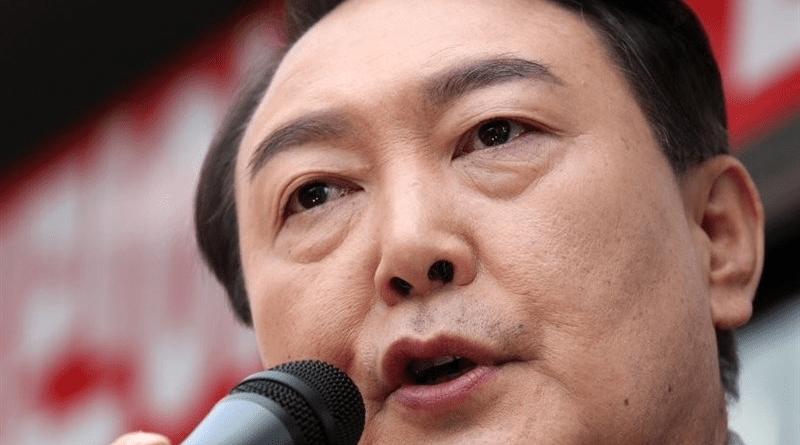South Korean Elections Cast A Shadow Over Yoon’s Presidency – Analysis
By Hannah Kim
The South Korean legislative elections on 10 April 2024 saw the opposition Democratic Party of Korea (DPK) win 175 seats and the ruling People Power Party (PPP) win 108 out of 300 seats at the National Assembly. The elections were an opportunity for the DPK to counterbalance the incumbent government’s legislative power.
The electoral landscape was difficult and unfavourable for the ruling party from the beginning with many of the PPP’s policy initiatives continuously thwarted by the DPK-controlled National Assembly. The unfavourable outcome of this election for the ruling party will intensify the challenges that it will face.
The overall turnout of the elections hit a 32-year high, with the final voter turnout estimated at 67 per cent of 44 million eligible voters. The high number of voters turning out to the polling stations signalled this election’s importance to Korean citizens.
Though the DPK and its allies already held around 50 per cent of seats prior to the election, the results were a blow to President Yoon Suk-yeol’s administration, with the PPP losing six seats and the DPK and its allies gaining 30 seats. In the aftermath, President Yoon stated that he would ‘humbly uphold the people’s will’ while then-leader of the PPP Han Dong-hoon said he would take responsibility by resigning from his post. Prime Minister Han Duck-soo and senior government officials, including then-Chief of Staff Lee Kwan-sup, also submitted their resignations.
The elections were held in the middle of Yoon’s presidential term, inevitably serving as a midterm evaluation of the current administration. Since the three-month mark of Yoon’s presidency, which began when he was elected in May 2022 by a narrow margin of 0.7 per cent, President Yoon’s approval ratings have consistently hovered around 30 to 40 per cent.
Despite gaining support with his medical reform initiative, his approval ratings struggled due to a series of incidents, including First Lady Kim Keon-hee’s Dior bag scandal, the recurrent use of his veto power, and intra-party conflicts with former and current PPP policymakers and politicians, including high-profile lawmakers Ahn Cheol-soo and Na Kyung-won and former PPP leader Lee Jun-seok, all of whom won their races in the legislative elections.
Other criticisms of Yoon included his comments on the price of everyday goods such as green onions, the controversy regarding the appointment of former defence minister Lee Jong-sup as ambassador to Australia, and the government’s lack of communication with both the public and the press.
President Yoon may find that the momentum behind his policy agenda will abate. His domestic policies, including medical industry reform, tax cuts and structural reform of the labour market, will continue to get pushback from the DPK. They will also continue to oppose Yoon’s foreign policy agenda, which includes maintaining a hawkish stance on North Korea, strengthening ties and security coordination with the United States and Japan to counterbalance China, and supporting Ukraine in its war against Russia.
This is not to say that President Yoon will be completely helpless in pushing forward his key agenda items. While the DPK scored a majority of seats, the party did not win the two-thirds supermajority that would have given it much more power — to potentially amend the constitution, override President Yoon’s veto power or even impeach him.
On balance, the political landscape may remain relatively similar to before the election since the PPP only lost six seats despite initial exit polls suggesting a larger DPK victory. The PPP is still the minority party while the DPK is still the majority party in the legislative body.
The results do not necessarily indicate that voters are fully supportive of the DPK. Due to growing dissatisfaction among both conservative and progressive voters of the major parties, many have flocked to support former justice minister Cho Kuk. Cho suddenly rose to prominence through his anti-Yoon stance, calling for an end to President Yoon’s administrationdue to alleged abuses of power and his involvement in the 2019 investigation into Cho and his family over allegations of corruption and academic fraud.
Cho Kuk has gained both significant support from voters and leverage as the leader of the new Rebuilding Korea Party (RKP), which secured 12 seats in the National Assembly. This minor liberal party is now the third-largest political party in South Korea, even though it was only created in February 2024 and has not yet shown any concrete political achievements. The extent to which the RKP collaborates with the DPK will critically shape the political landscape for the next three years.
The new parliament starts its four-year term in May, and President Yoon is likely to face one of his toughest challenges since his inauguration. Not only will he need to find a way to cooperate with a new opposition-dominated National Assembly, but he will also have to successfully reshuffle his government. He also needs to bring together a deeply divided country, one that has continuously struggled with polarisation, even before he took office. To avoid a lame duck presidency, President Yoon will need to adroitly tackle these formidable tasks before the end of his term in 2027.
- About the author: Hannah June Kim is Assistant Professor and Director of the Korea and East Asia Studies Program in the Graduate School of International Studies (GSIS) at Sogang University.
- Source: This article was published by East Asia Forum

